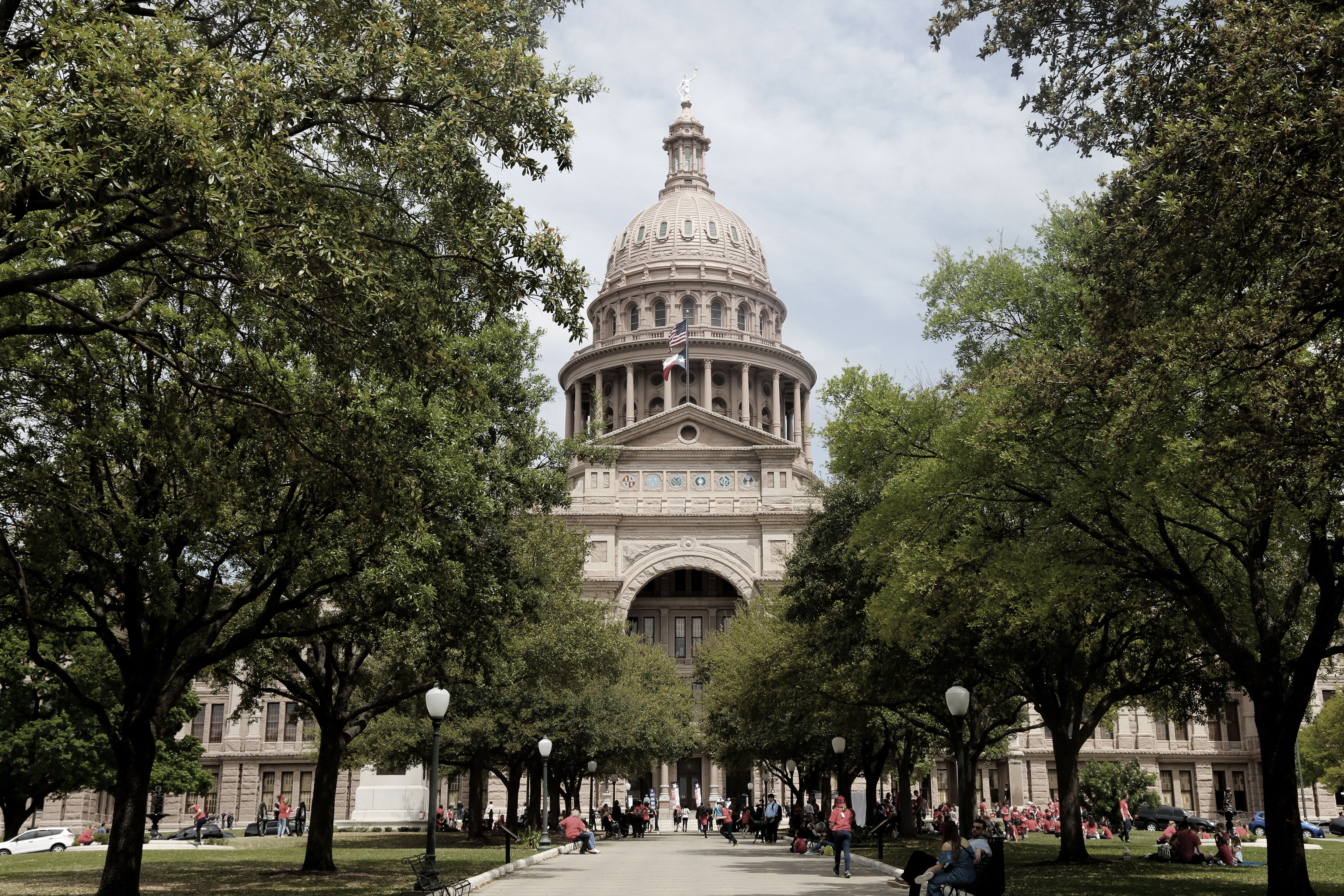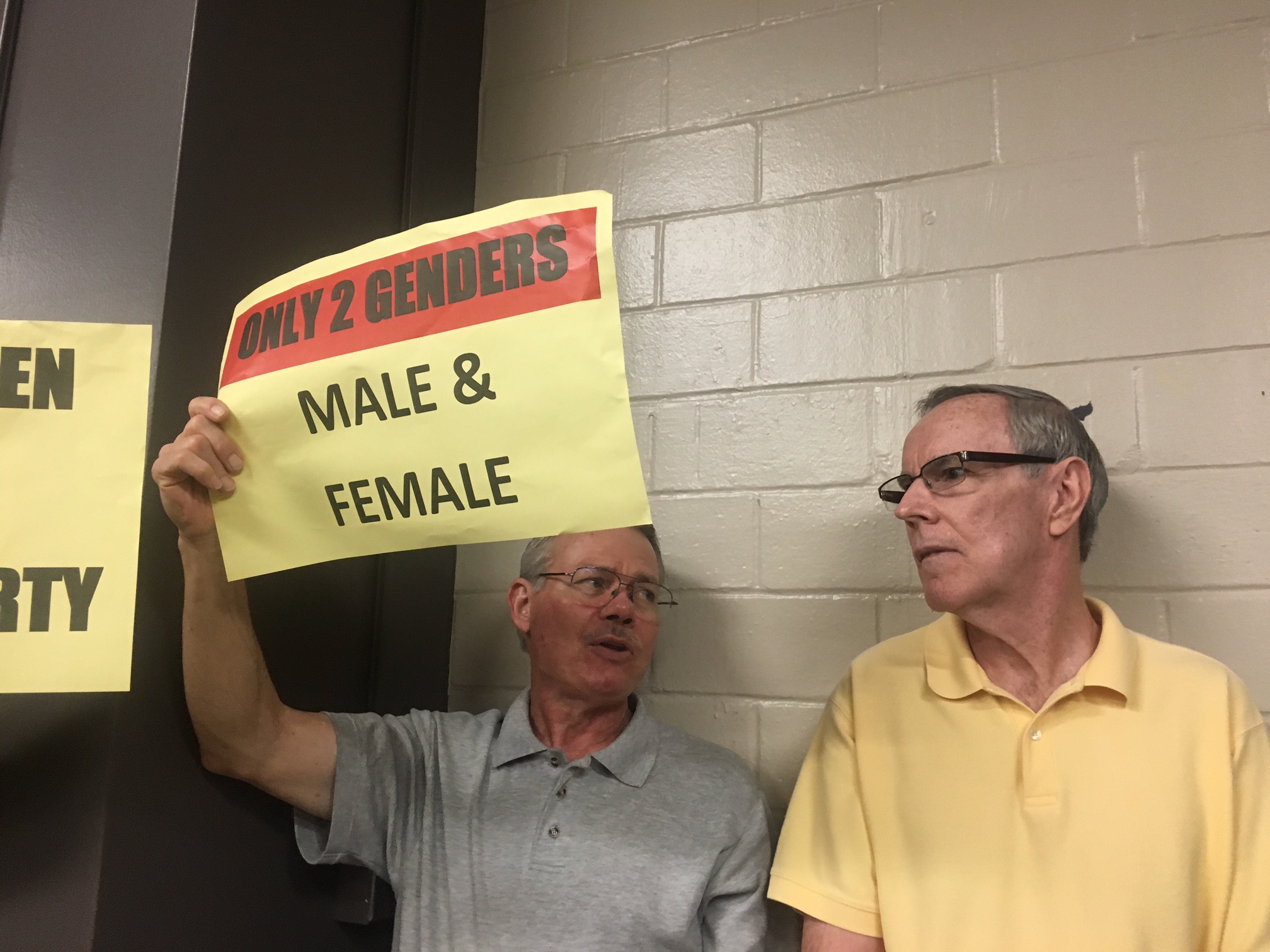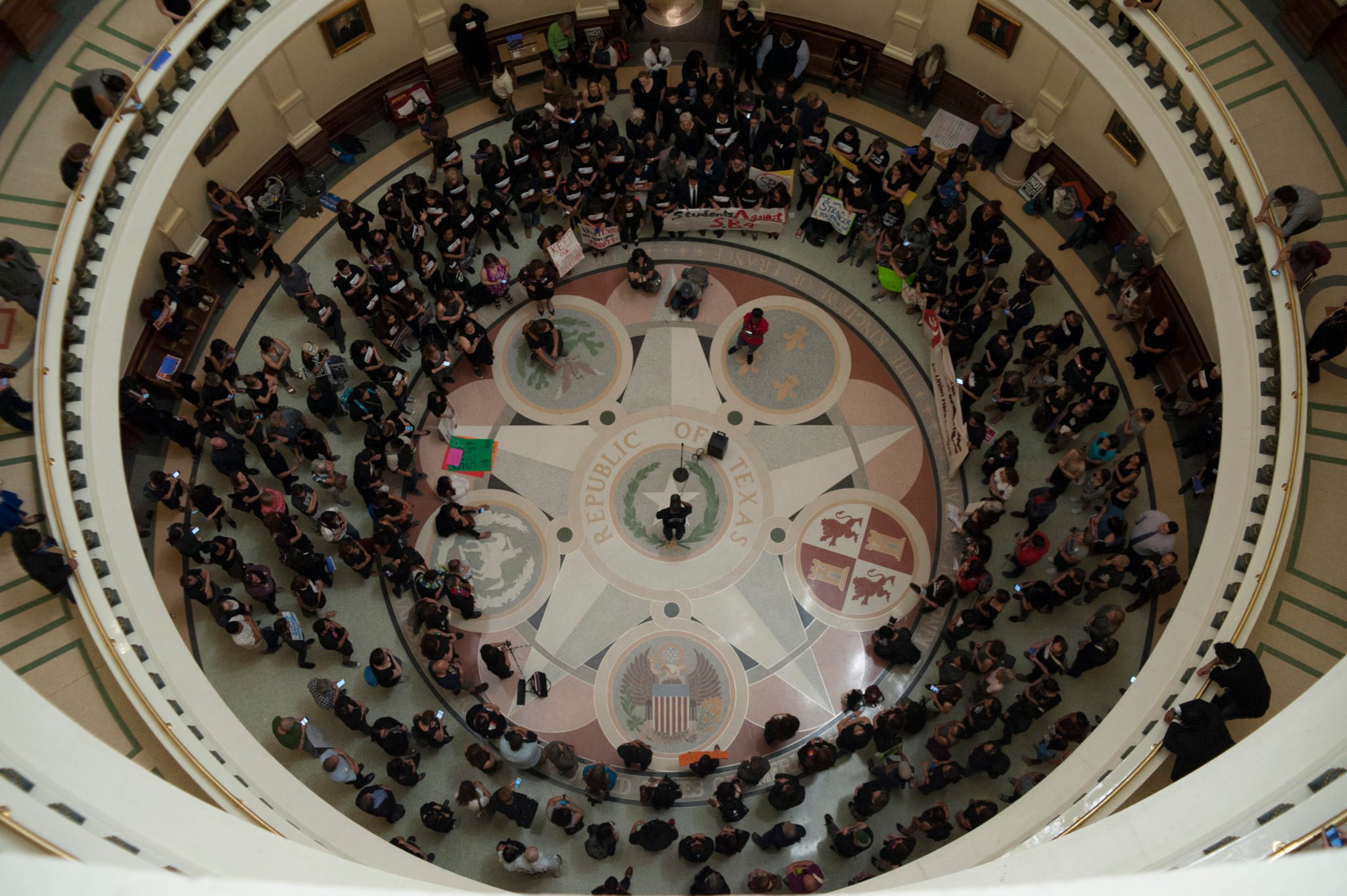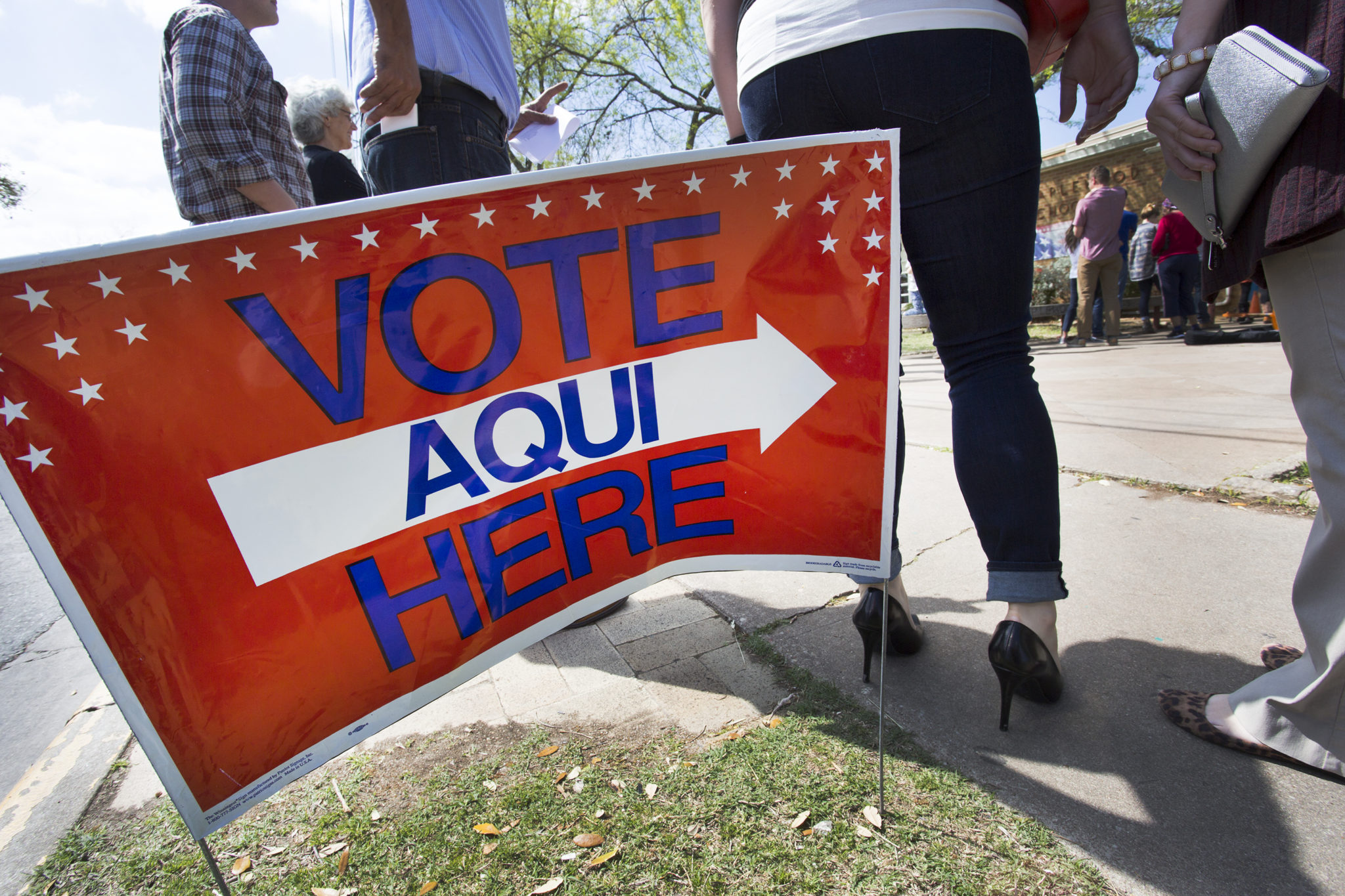
With Bill to Abolish Straight-Ticket Voting, Is Texas Hurtling Toward Another Civil Rights Lawsuit?
A GOP-backed bill, which Democrats said would be challenged in court as voter suppression, will be considered by a Senate committee Thursday.

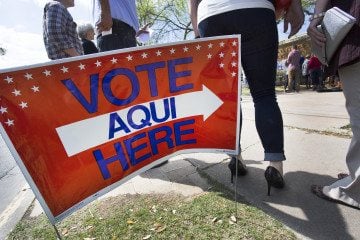
May 17 Update: The Texas Senate tentatively passed House Bill 25 on a 20-10 vote along party lines after about an hour of debate. Democrats repeated that the legislation would prompt a civil rights lawsuit. Pending final approval Thursday, the bill will head to the governor’s desk.
A bill advancing through the Legislature that would drastically change how the majority of Texas voters cast ballots could embroil the state in yet another voting discrimination lawsuit, critics say. House Bill 25 would abolish “straight-ticket” voting, the “one-punch” option at the top of Texas ballots that allows voters to simultaneously cast a vote for all the candidates of a single political party.
Backed by conservative leadership, the bill would slow down the voting process for a majority of the state electorate: 63 percent of Texas voters used the straight-ticket option in the 2016 presidential election, according to Texas Elections Source. Voters would still be able to cast ballots for all the candidates of one party, but HB 25 would make voters select them one by one.
The proposal passed the House over the weekend and will be considered by the Senate Business and Commerce Committee Thursday.
House Democrats on Friday argued eliminating the “one-punch” choice would constitute an attack on Texans’ voting rights, particularly the disabled, the elderly and voters in large cities, where ballots and lines are longer and more people rely on public transportation. Multiple lawmakers said minority voters rely on the straight-ticket option more than Anglos, evidence that was used as the basis of a 2016 federal court ruling that blocked a similar law in Michigan.
“This bill hasn’t been vetted,” said Representative Ron Reynolds, D-Missouri City. “We don’t know how much it will cost; we don’t know if it will violate the Voting Rights Act of 1964. What we do know is that federal courts have ruled recently that laws passed by Texas discriminated against African-American and Hispanic voters.”
Three federal court rulings since March have found that Texas intentionally discriminated against African-American and Hispanic voters in voter ID and redistricting cases. The author of HB 25, Representative Ron Simmons, R-Carrollton, said repeatedly during debate Friday night that he was not aware of the rulings.
“I’ve been busy down here,” he said on the House floor, defending his lack of knowledge of the widely reported court decisions.

Representative Harold Dutton Jr., D-Houston, predicted the bill would be challenged “as a voter suppression bill.”
In the Michigan ruling last July, a federal judge wrote that abolishing the straight-ticket option would disproportionately impact African-American voters, who use it more often and already face longer voting lines in urban areas. The measure was designed “to require voters to spend more time filling more bubbles,” which could “discourage voting,” wrote Judge Gershwin A. Drain. The Supreme Court declined to hear Michigan’s appeal in September.
Simmons, on the other hand, argues his bill would create a more educated electorate because, he says, the one-punch option encourages people to vote without researching candidates.
“Limited knowledge yields bad candidates, bad elected officials and bad government,” said Simmons at a House Committee on Elections hearing in March, adding he doesn’t believe his bill would diminish voter turnout.
There’s little partisan tilt in the use of straight-ticket voting statewide. Across Texas, 65 percent of Trump’s votes and 64 percent of Clinton’s came from straight-ticket ballots, according to Texas Elections Source. But many say the option contributed to a big Democratic win in Harris County, where the party won every major race and all 24 judicial races in 2016.
Since at least 2008, Democrats have been cleaning up down-ballot races in the state’s largest cities — giving Republicans a potential motive for abolishing the option.
Conservative attempts to eliminate straight-ticket voting aren’t new: Republicans in Texas have unsuccessfully tried to limit or abolish the practice since the early ’90s, and they’re part of a national trend. Texas is one of only 10 states that has a straight-ticket option. Since 1994, 12 states have abolished or limited the practice.
Myrna Pérez, a deputy director at the Brennan Center for Justice, said there’s no simple explanation for why such laws survived in many states, but not in Michigan. She called the relationship between straight-ticket voting and the Voting Rights Act an “open question,” and pointed to a 2016 federal ruling that struck down sections of North Carolina’s voter ID law, but didn’t address the issue of straight-ticket voting.
“Straight-ticket affects different communities differently,” Pérez said. “Cases brought under the Voting Rights Act require an extensive fact-based inquiry as to intent and impact.”
Back in February, Texas Chief Justice Nathan Hecht, a Republican, gave the anti-straight-ticket effort a push when he decried the Harris County election that ousted 11 Republican judges.
“Such partisan sweeps are demoralizing to judges and disruptive to the legal system,” wrote Hecht in his February 1 State of the Judiciary. Hecht called for judges to be removed from straight-ticket voting, and for an eventual end to partisan judicial races in Texas.
Texas House Speaker Joe Straus, R-San Antonio — who himself carried an anti-straight-ticket bill in 2009 — doubled down on Hecht’s suggestion in a statement the same day.
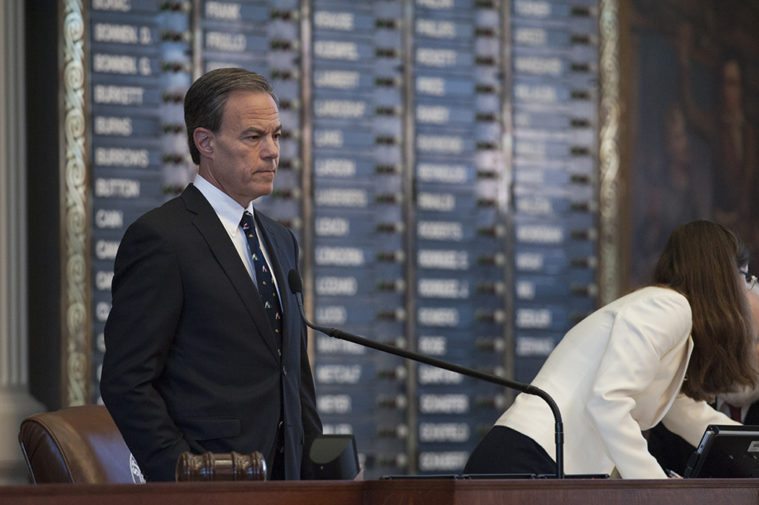
“Texas should join 40 other states and end straight-ticket voting in all elections,” said Straus in a February 1 press release. “I look forward to working with my colleagues to address this issue.”
Dallas County Judge Clay Jenkins, a Democrat, estimates the bill would cost Dallas County $885,000 in 2018 in infrastructure and personnel costs.
The bill passed in the House Friday 85-59. A handful of Republicans, mostly representing deep red suburban or rural districts, broke ranks and voted against the proposal. But they were far outnumbered, and did not participate in the heated floor debate.
As the bill moves to the Senate, it may have another crucial ally: Lieutenant Governor Dan Patrick carried a bill in 2009 that would have eliminated straight-ticket voting in judicial races. Patrick’s office did not respond to a request for comment.
A Senate bill that would end straight-ticket voting only for judges was left pending in committee on Monday.
Correction: An earlier version of this article reported a federal court upheld North Carolina’s elimination of straight-ticket voting. In fact, the court did not address the issue. The Observer regrets the error.
